|
|
|
Sort Order |
|
|
|
Items / Page
|
|
|
|
|
|
|
| Srl | Item |
| 1 |
ID:
132034
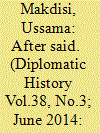

|
|
|
|
|
| Publication |
2014.
|
| Summary/Abstract |
The question of how to represent the U.S. role in the Middle East brings to the fore the question that Edward Said first raised in 1978 in Orientalism about the nature of American understandings of the Middle East. More than three decades after the publication of his book, Said's criticism of Orientalist scholarship-and his accompanying plea for a secular humanistic interpretation to replace it-remain both topical and enigmatic. It is one thing to criticize American representations of foreign cultures; it is an entirely different matter to study American engagements with them. These are by no means unrelated endeavors, but by the same token, they entail very different conceptions of what constitutes a field of inquiry and how to go about studying it comprehensively. The recent emergence of a more critical scholarship of America and the Middle East, therefore, begs the question of whether it is possible to write a history that takes both the Americans and Arabs equally seriously despite the prevailing political climate, and ultimately what kind of methodology this might entail for the rewriting of U.S.-Arab relations, and more broadly, American involvement in the world.
|
|
|
|
|
|
|
|
|
|
|
|
|
|
|
|
| 2 |
ID:
132032
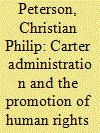

|
|
|
|
|
| Publication |
2014.
|
| Summary/Abstract |
This article will examine the effectiveness of the Carter administration's efforts to promote human rights in the Soviet Union. It will pay particular attention to how human rights promotion fit into a larger approach to transforming Superpower relations in ways favorable to U.S. interests called "reciprocal accommodation [détente]." The use of this framework provides an excellent way to tease out the complexities of how the administration balanced the promotion of human rights in the USSR with other important objectives such as concluding the SALT II treaty. It also helps reveal how executive branch worked to reduce Soviet human rights violations by citing the provisions of the Final Act and working with private citizens to raise international awareness about human rights issues. Without losing sight of his administration's inability to protect Soviet dissenters from arrest and harassment, this article will demonstrate that Carter had every intention of making the issue of human rights an important element of Cold War competition and implementing a new approach to détente that at least in part aimed at transforming Soviet internal behavior.
|
|
|
|
|
|
|
|
|
|
|
|
|
|
|
|
| 3 |
ID:
132027
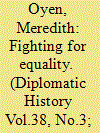

|
|
|
|
|
| Publication |
2014.
|
| Summary/Abstract |
An early battle in the war to gain greater equality for China on the international stage emerged in an unexpected place: Aboard ships around the world sailing for the Allied Merchant Marine. During the Second World War, at least twenty thousand Chinese seamen worked on mostly British ships. Chinese worked long hours, received lower wages than white sailors engaged in the same work, were never given the war risk bonus offered to keep other members of the crew on duty during periods of high risk, and were routinely denied shore leave at U.S. ports on the grounds that they posed a flight risk. In response, Chinese seamen deserted in uniquely high rates, en masse instead of one individual at a time. The nature and scope of the desertions threatened the success of the supply operation, leading the governments involved to come together to try to prevent them.This article explores the multilateral negotiations that endured as long as the war itself. These centered upon three of the most basic inequalities endured by Chinese sailors-unequal pay, lack of war risk bonuses, and lack of shore leave. Using government records from all three parties (the United States, Great Britain, and the Republic of China) as well as press and collections from private organizations, I demonstrate the ways in which racial inequalities ingrained in the international system hindered advances for the Chinese seamen, challenged the smooth management of both Anglo-Chinese and Chinese-American relations, and sparked conflict between the Nationalist Chinese government and the seamen themselves. The legacies of British colonialism in Asia and American exclusion of Chinese combined with wartime public opinion to push forward changes when international union efforts failed.
|
|
|
|
|
|
|
|
|
|
|
|
|
|
|
|
| 4 |
ID:
132026
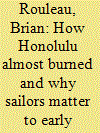

|
|
|
|
|
| Publication |
2014.
|
| Summary/Abstract |
This article argues that in ignoring the exploits of American sailors overseas, diplomatic historians have missed a very important facet of the early republic's foreign relations. It claims that 1898 did not represent any decisive turn to the international, but rather, a moment in which primary control over the nation's foreign relations shifted from maritime nonstate actors to the state itself. To make this case, the essay discusses the form and substance of violent altercations between American seafarers and those they encountered abroad. It reads barroom brawling and harborside tumult as "diplomatic fisticuffs," that is, as sites for the enactment of a distinct, working-class and masculine foreign relations agenda. Politicians, diplomats, and missionaries, however, saw the mighty influence seafaring men exerted overseas as deeply problematic. But even as the American state worked to control rambunctious sailors, late nineteenth-century policy makers discovered that appropriating the violent words and deeds of the nation's nautical class could prove useful in justifying imperial adventure abroad. Thus even as the nation's mariners receded from view overseas, they continued to influence events around the globe.
|
|
|
|
|
|
|
|
|
|
|
|
|
|
|
|
| 5 |
ID:
132025
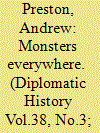

|
|
|
|
|
| Publication |
2014.
|
| Summary/Abstract |
This article, based on the 2014 Stuart L. Bernath Lecture, traces the emergence of "national security" as a foreign policy doctrine that came to define the safety of the United States in extremely broad terms, both geographically and ideologically. Doing so reveals that "national security" has its own history. The concept was invented by fusing long-standing, traditional concerns about U.S. territorial sovereignty with a newer, thoroughly revolutionary desire to protect and promote America's core values on a global scale. Franklin D. Roosevelt's legacy looms large in the history of American foreign relations, but it was his use of fear to invent the modern doctrine of national security that is possibly its most consequential aspect. After a couple of false starts, a fusion of geographical and ideological security took place during the world crisis of the late 1930s and the world war that followed. The results have defined U.S. foreign policy ever since.
|
|
|
|
|
|
|
|
|
|
|
|
|
|
|
|
| 6 |
ID:
132029
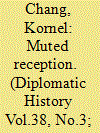

|
|
|
|
|
| Publication |
2014.
|
| Summary/Abstract |
During the Second World War, the United States developed a propaganda apparatus to counter fascist propaganda in Mexico, and later, in Latin America more broadly. Mobilizing the resources and expertise of Hollywood, multinational corporations, and the social sciences, the United States attempted to gauge and sway Mexican popular opinion. This concerted effort at mass persuasion marked the first time that the United States attempted to systematically shape inter-American relations by influencing popular public opinion directly. But this project to inculcate the Mexican masses with U.S. propaganda was marred by difficulties and mishaps that hindered and distorted its transmission. On the other side, Mexicans contested, negotiated, and resisted these overtures, indicating that the influence of U.S. propaganda was neither irresistible nor straightforward. This is a story, then, about U.S. wartime propaganda, how it was developed on the ground and its muted reception in Mexico.
|
|
|
|
|
|
|
|
|
|
|
|
|
|
|
|
| 7 |
ID:
132028
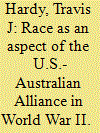

|
|
|
|
|
| Publication |
2014.
|
| Summary/Abstract |
World War II marked a watershed for American diplomatic practice as the nation moved away from its traditional ideas of unilateralism toward a foreign policy based on the construction of foreign alliances and relationships. Many of those relationships continue to be a central part of American diplomacy and one of the strongest is the American relationship with Australia. Historical study of the American-Australian alliance traditionally focused on how the alliance came into being because of the economic relationship between the two powers or because of the exigencies of World War II in the Pacific. What emerged from these studies was an overly simplistic understanding of what was dynamic and complex relationship between two states who often found themselves at cross-purposes. This essay points to the presence of a shared sense of racial identity among the general populaces and how this was utilized by policymakers to ameliorate the contentious nature of the alliance during the war. The creation of the American-Australian relationship was often as much driven by ideas of how the world was ordered as it was by the reality of events facing the two states during the war.
|
|
|
|
|
|
|
|
|
|
|
|
|
|
|
|
| 8 |
ID:
132030
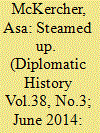

|
|
|
|
|
| Publication |
2014.
|
| Summary/Abstract |
Studies examining the initial response of the United States to Cuba's revolution largely ignore the role of Congress, an oversight reflecting both a scholarly trend emphasizing the actions of the presidency in regards to American foreign policy making and the separation of powers in the U.S. constitution. Redressing the balance, this article examines how members of Congress reacted to the course of U.S.-Cuban relations throughout the crisis years of 1959-1963. Illuminating Cuba's place in domestic debates about foreign affairs it also looks at the politics surrounding the American response to the Cuban revolution. Lawmakers quickly emerged at the forefront of those calling for a strong stance toward Cuba. In turn, congressional pressure to confront Fidel Castro both helped and hindered presidents Dwight Eisenhower and John Kennedy. For Kennedy, in particular, domestic politics and actions by Congress were major concerns that tempered his actions in dealing with the Cuban revolution.
|
|
|
|
|
|
|
|
|
|
|
|
|
|
|
|
|
|
|
|
|